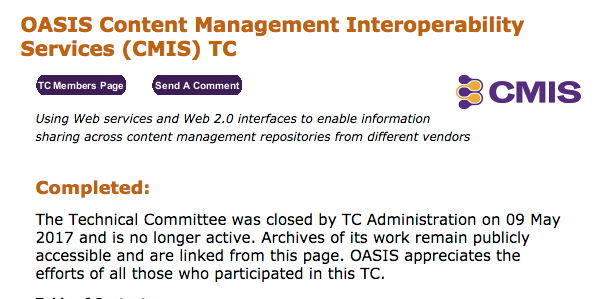ECM Standards in Perspective
The role of standards in content technologies has always been a popular topic. Could standards help mitigate the chaos of different repositories, APIs, and information formats? Customers clearly have noticed: I’ve seen numerous RFPs with a section dedicated to support for specific standards. However, in real life I don’t see ECM standards proving particularly meaningful, and you should see them as a relative benefit rather than absolute must-have.
Some Decline
In ECM, two standards that generated a lot of chatter were JCR (170 and 283) and OASIS Content Management Interoperability Services (CMIS). JCR remains a niche standard in the Web Content & Experience Management (WCM) world, where a small handful of vendors apply it.
CMIS emerged with more fanfare and we have ourselves blogged quite a bit about it. Sure, CMIS has had it followers and several vendors supported it (several still do), but CMIS hasn't really been “tearing up the tracks.” The homepage of OASIS TC has this note:
The Technical Committee was closed by TC Administration on 09 May 2017 and is no longer active.

Figure: OASIS CMIS Technical Commitee Page
The Case for Standards
The business case for employing standards is that in theory they allow you to:
- Easily integrate and interoperate with other enterprise applications
- Rationalize your skills, hardware, software, and resources
- Enable faster time to market because you can buy applications off-the-shelf
- Create portable applications
- Enjoy a more predictable and simpler development lifecycle
- Focus on your business, rather than commodity tasks
Seemingly that's a strong case. However, there are many reasons that inhibit a standard’s adoption. Specifically for ECM and other information management disciplines, the major issue is that these technologies cater to a highly variable set of use cases that often require advanced customization to create business-friendly applications.
An ECM system may target not just document management but also case management, BPM, workflows, imaging, and so forth. A standard often ends up being a lowest common denominator and that means you will anyways need to resort to proprietary mechanisms to realize true business applications.
Finally, from a vendor's perspective, they lose the ability to differentiate from competition. If all products were to provide features based on standards then it would become difficult for product vendor A to be better than B. It's not just Microsoft taking the approach of "embrace and extend."
What Should You Do?
As an end user of ECM technologies, remember that while a standards-based approach can be helpful, a more standards-based solution may not always present the best fit for you.
Sure, you should maintain pressure on your vendors to comply with standards. Just remember that standards adherence represents just one dimension of your decision-making. Don't always apply them as a yes-no filter. You should understand the trade-offs and then make an educated judgment.
In RSG's ECM (and other evaluations), we call out different products’ support for popular standards. Ping us for more details.





